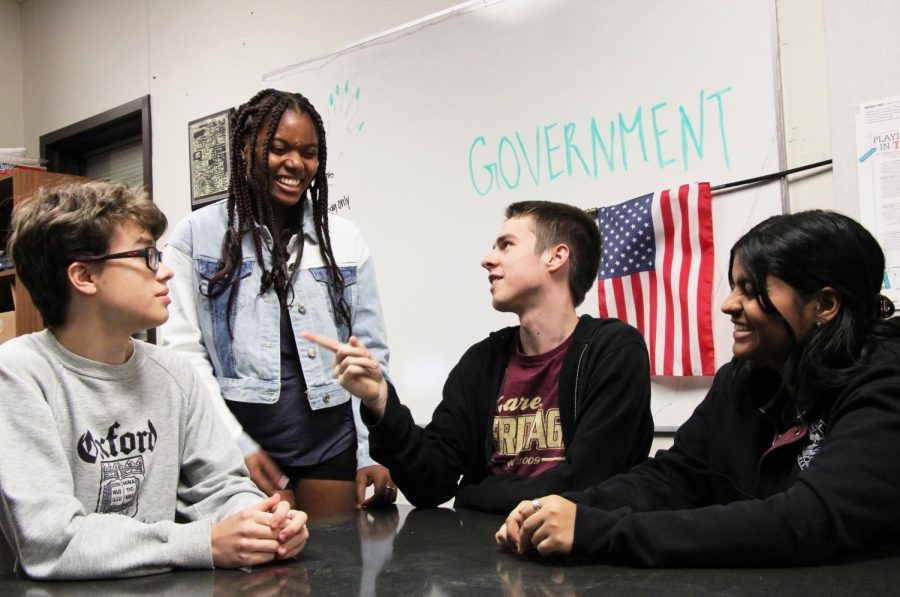A Minor Voice
Students takes on legislation and involvement in Roe V. Wade decision
November 6, 2022
Generation Z lives on the internet. Young people constantly spew or share information across platforms. So when “Supreme Court overturns Roe v. Wade” headlined all news sources online this past summer, it was no shocker that teens everywhere became a part of the discussion.
Roe v. Wade was a decision made by the Supreme Court in 1973 to allow abortion to be constitutional. This year on June 24, the court announced a decision to declare abortion law to be no longer federally controlled, allowing states to enact their own guidelines on abortion. This led many states like Texas, Alabama and Oklahoma to ban abortion either all together, or up until the early stages of pregnancy, according to Center for Reproductive Rights.
This news brought many varied reactions from all Americans, but a prominent portion were from a group that can’t elect political leaders: teenagers.
Since the legal age to vote in the U.S. is 18, teens are limited in how they can participate in the country’s democracy system. This has left some students feeling as though they don’t play enough of a role in today’s government.
“Most of the decisions being made are by the higher ups, and since you have to be at least 18 to vote, minors don’t really have a say in the government,” Junior Mihika Yamijala said.
Even with the limitations teens have, some still feel that they’re involved in the government and agree with the way that the system works.
“I’m a U.S. citizen, we’re a democracy,” Sophomore Rudy Sathish said. “I’m an informed citizen and that’s the whole ideology behind a democracy, to be informed and affected by the decisions made in the democracy.”
Even though minors can’t legally vote, teens still don’t think that the voting age should be lowered for many reasons.
“Teens are still underage and undeveloped in their ideas, they shouldn’t really have the power to make big decisions,” Senior Pranitha Sayam said. “Still at 18, sometimes ideas are not fully developed and they still haven’t experienced things and may not even be educated that much when it comes to the government.”
Even if teens can’t vote, they still want to be at least more considered when it comes to decisions that will affect them now and as adults.
Based on the views that these young people have, their perspective on the amount of involvement that teens should have had on the decision of Roe v. Wade was like.
“I think teenagers are heavily affected by abortions and their accessablity, but I think we’re not heard at all, not listened to, not sought after by politicians when making these decisions like that,” Sathish said. “I think that’s a mistake on their part, and it’s unfortunate that teenagers who had such a huge sway in politics through [things like social media] aren’t discussed in the context of these decisions.”
Another issue that students had with the decision was that all of the members on the Supreme Court are over 50 years old, saying that their ideals were outdated and biased.
“A lot of them are keeping in mind religious beliefs more so than what’s important for the people and the people that it’ll directly affect think,” Yamijala said.
The way these students feel doesn’t only apply to the decision of Roe v. Wade, but also any other law, rule or verdict decided by government officials that will have an impact on the future generation.
This raises the question: are there changes that need to be made?
One way that teens want to see change is by bringing more attention to young people staying educated within politics and forming opinions.
“Be informed,” Sathish said. “I think it’s not enough to not have a side or to not have an opinion in politics, especially because we live in a really polarizing time right now and I think it’s super important to have an understanding and to be aware and to actively make an effort to make sure you see the change that you wanna implement into society. We shouldn’t take it for granted and should try to make the change we want to see.”
“I feel like a lot of teens are easily influenced by other people and don’t think for themselves or do their own research which makes them unaware and just want to follow the popular majority,” Yamijala said. “I feel like teens should be more responsible and put more effort into finding out what works for them.”
At the 2023 Texas legislative session, lawmakers will discuss gun control laws after the events of the Uvalde shooting, the use of school vouchers and fixing the power grid. Teens won’t have a direct say in the people making the big decisions, but by staying aware, there may be a change made.
Some feel that teens are doing well by voicing their opinions, but need to overall be more assertive.
“I feel like there is a very submissive feeling when it comes to teens, they’ll sit back on their computer and voice their opinions in the dark,” Sayam said. “I think people really need to speak for themselves and go out and try to do something physically like maybe form a group of people and try and spread awareness. If you’re gonna be submissive that’s not gonna get us anywhere, we all need to be dominant people.”



